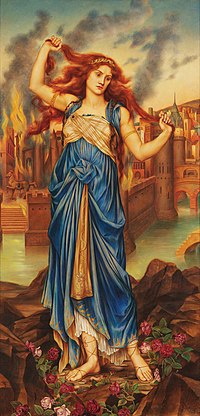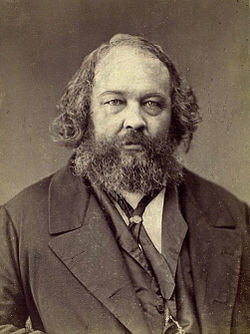From Wikipedia, the free encyclopedia
The Cassandra metaphor (variously labelled the Cassandra 'syndrome', 'complex', 'phenomenon', 'predicament', 'dilemma', or 'curse') occurs when valid warnings or concerns are dismissed or disbelieved.
The term originates in Greek mythology. Cassandra was a daughter of Priam, the King of Troy. Struck by her beauty, Apollo provided her with the gift of prophecy, but when Cassandra refused Apollo's romantic advances, he placed a curse ensuring that nobody would believe her warnings. Cassandra was left with the knowledge of future events, but could neither alter these events nor convince others of the validity of her predictions.
The metaphor has been applied in a variety of contexts such as psychology, environmentalism, politics, science, cinema, the corporate world, and in philosophy, and has been in circulation since at least 1949 when French philosopher Gaston Bachelard coined the term 'Cassandra Complex' to refer to a belief that things could be known in advance.[1]
Usage
Psychology
The Cassandra metaphor is applied by some psychologists to individuals who experience physical and emotional suffering as a result of distressing personal perceptions, and who are disbelieved when they attempt to share the cause of their suffering with others.Melanie Klein
In 1963, psychologist Melanie Klein provided an interpretation of Cassandra as representing the human moral conscience whose main task is to issue warnings. Cassandra as moral conscience, "predicts ill to come and warns that punishment will follow and grief arise."[2] Cassandra's need to point out moral infringements and subsequent social consequences is driven by what Klein calls "the destructive influences of the cruel super-ego," which is represented in the Greek myth by the god Apollo, Cassandra's overlord and persecutor.[3] Klein's use of the metaphor centers on the moral nature of certain predictions, which tends to evoke in others "a refusal to believe what at the same time they know to be true, and expresses the universal tendency toward denial, [with] denial being a potent defence against persecutory anxiety and guilt."[2]
Laurie Layton Schapira
In a 1988 study Jungian analyst Laurie Layton Schapira explored what she called the "Cassandra Complex" in the lives of two of her analysands.[4]Based on clinical experience, she delineates three factors which constitute the Cassandra complex:
- dysfunctional relationships with the "Apollo archetype",
- emotional or physical suffering, including hysteria or ‘women’s problems’,
- and being disbelieved when attempting to relate the facticity of these experiences to others.[4]
Addressing the metaphorical application of the Greek Cassandra myth, Layton Schapira states that:
What the Cassandra woman sees is something dark and painful that may not be apparent on the surface of things or that objective facts do not corroborate. She may envision a negative or unexpected outcome; or something which would be difficult to deal with; or a truth which others, especially authority figures, would not accept. In her frightened, ego-less state, the Cassandra woman may blurt out what she sees, perhaps with the unconscious hope that others might be able to make some sense of it. But to them her words sound meaningless, disconnected and blown out of all proportion.[6]
Jean Shinoda Bolen
In 1989, Jean Shinoda Bolen, Clinical Professor of Psychiatry at the University of California, published an essay on the god Apollo[7] in which she detailed a psychological profile of the ‘Cassandra woman’ whom she suggested referred to someone suffering — as happened in the mythological relationship between Cassandra and Apollo — a dysfunctional relationship with an “Apollo man”. Bolen added that the Cassandra woman may exhibit “hysterical” overtones, and may be disbelieved when attempting to share what she knows.[8]According to Bolen, the archetypes of Cassandra and Apollo are not gender-specific. She states that "women often find that a particular [male] god exists in them as well, just as I found that when I spoke about goddesses men could identify a part of themselves with a specific goddess. Gods and goddesses represent different qualities in the human psyche. The pantheon of Greek deities together, male and female, exist as archetypes in us all… There are gods and goddesses in every person."[9]
"As an archetype, Apollo personifies the aspect of the personality that wants clear definitions, is drawn to master a skill, values order and harmony, and prefers to look at the surface rather than at what underlies appearances. The Apollo archetype favors thinking over feeling, distance over closeness, objective assessment over subjective intuition."[10]
Of what she describes as the negative Apollonic influence, Dr. Bolen writes:
Individuals who resemble Apollo have difficulties that are related to emotional distance, such as communication problems, and the inability to be intimate… Rapport with another person is hard for the Apollo man. He prefers to access (or judge) the situation or the person from a distance, not knowing that he must "get close up" – be vulnerable and empathic – in order to truly know someone else…. But if the woman wants a deeper, more personal relationship, then there are difficulties… she may become increasingly irrational or hysterical.[8]Bolen suggests that a Cassandra woman (or man) may become increasingly hysterical and irrational when in a dysfunctional relationship with a negative Apollo, and may experience others' disbelief when describing her experiences.[8]
Corporate world
Foreseeing potential future directions for a corporation or company is sometimes called ‘visioning’.[11] Yet achieving a clear, shared vision in an organization is often difficult due to a lack of commitment to the new vision by some individuals in the organization, because it does not match reality as they see it. Those who support the new vision are termed ‘Cassandras’ – able to see what is going to happen, but not believed.[11] Sometimes the name Cassandra is applied to those who can predict rises, falls, and particularly crashes on the global stock market, as happened with Warren Buffett, who repeatedly warned that the 1990s stock market surge was a bubble, attracting to him the title of 'Wall Street Cassandra'.[12]
Environmental movement
Many environmentalists have predicted looming environmental catastrophes including climate change, rise in sea levels, irreversible pollution, and an impending collapse of ecosystems, including those of rainforests and ocean reefs.[13] Such individuals sometimes acquire the label of 'Cassandras', whose warnings of impending environmental disaster are disbelieved or mocked.[13] Environmentalist Alan Atkisson states that to understand that humanity is on a collision course with the laws of nature is to be stuck in what he calls the 'Cassandra dilemma' in which one can see the most likely outcome of current trends and can warn people about what is happening, but the vast majority can not, or will not respond, and later if catastrophe occurs, they may even blame you, as if your prediction set the disaster in motion.[14] Occasionally there may be a "successful" alert, though the succession of books, campaigns, organizations, and personalities that we think of as the environmental movement has more generally fallen toward the opposite side of this dilemma: a failure to "get through" to the people and avert disaster. In the words of Atkisson: "too often we watch helplessly, as Cassandra did, while the soldiers emerge from the Trojan horse just as foreseen and wreak their predicted havoc. Worse, Cassandra's dilemma has seemed to grow more inescapable even as the chorus of Cassandras has grown larger."[15]


